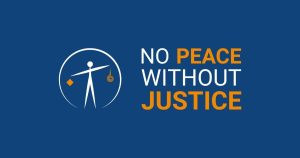Brussels, 11 February 2020
People in Sudan who are the subject of International Criminal Court arrest warrants may be sent to The Hague to face justice, according to an agreement brokered today between the transitional government and rebel groups in Sudan. Sudanese official Mohammed al-Hassan al-Taishi confirmed in a statement issued after the Juba Peace Talks that the two sides have agreed on a mechanism through which that can happen. Many people, including first and foremost victims of the crimes committed in Darfur, have been calling for this since the change of regime in April 2019 that saw former President Omar al-Bashir deposed and eventually convicted on corruption charges in Sudan in December 2019.
“No Peace Without Justice welcomes this statement by the Sudanese authorities that would finally see Sudan live up to its international obligations to hand over those wanted for war crimes, crimes against humanity and genocide to the ICC”, said Alison Smith, International Justice Director for No Peace Without Justice. “It has been a long time coming, and the road to justice and redress for the victims is no doubt longer still. But at least this obstacle has been removed and there now seems to be a glimmer of political will to allow justice to take its course.”
“Of course, the biggest fish subject to a ICC arrest warrant is former President Bashir and given the number of victims he is alleged to have created, we urge the Sudanese military to reverse its position of last April and allow President Bashir to be transferred to The Hague. His transfer would send a strong signal to the victims of the crimes in Darfur that their suffering is finally being addressed and to other would-be perpetrators that their official position, even as head of State, will not protect them forever”, Ms Smith continued.
“That said, President Bashir is not the only person in Sudan subject to an arrest warrant and the victims of those crimes equally deserve their day in court. We urge that the transfer of all fugitives in Sudan happen without delay to ensure the people of Darfur and Sudan can finally see justice being done. We call upon the International Criminal Court to play its part in ensuring the trials will have a positive impact in Sudan as part of its transitional justice process, including through revamping their outreach in the country and ensuring that victims can participate meaningfully in what we hope will be trials in The Hague (or indeed in Khartoum) in the not too distant future,” Ms Smith concluded.
For further information, contact Alison Smith, Director Of International Justice Program, on asmith@npwj.org or Nicola Giovannini, Press & Public Affairs Coordinator, on ngiovannini@npwj.org org.




